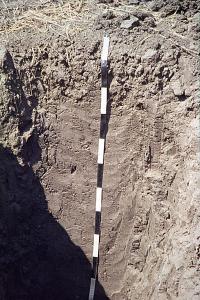Reference soil Namibia 09: Vertisol
Vertisols occur dominantly in level landscapes under climates with a pronounced dry season. Vast areas are found in Australia, India, northeastern Africa (Sudan, Ethiopia), southern Latin America and the USA.
Characteristics
Soils having a vertic horizon (a clayey subsurface horizon with polished and grooved ped surfaces ("slickensides") or wedge-shaped or parallelepiped structural aggregates) within 100 cm from the soil surface. They have 30 percent or more clay in all horizons to a depth of 100 cm or more, or to a contrasting layer (lithic or paralithic contact, petrocalcic, petroduric or petrogypsic horizons, sedimentary discontinuity, etc.) between 50 and 100 cm, after the upper 20 cm have been mixed. In addition, Vertisols exhibit wide cracks, which open and close periodically.
Classification
WRB 2006
| Grumic Calcic Vertisols (Pellic ) |
| 20-40 | cambic horizon |
| - | secondary carbonates horizon |
| 40-110 | vertic horizon |
WRB 1998
| calcic horizon Pelli Vertisols |
FAO-UNESCO-ISRIC 1988
| Calcari-Eutric Vertisols |
| - | calcareous horizon |
| - | slickensides horizon |
| 0-20 cm | ochric A horizon |
| 20-110 cm | cambic B horizon |
FAO-UNESCO-ISRIC 1974
| Pellic Vertisols |
| - | slickensides horizon |
| - | vertic horizon |
| 0-20 cm | ochric A horizon |
| 20-110 cm | cambic B horizon |
| USDA-NRCS (1999) | Aridic Haplustert |
| USDA-SCS (1975) | Aridic Pellustert ustic fine mixed hyperthermic |
Grootfontein District, 30km E of Tsumeb, Farm Smithfield, lot 541
